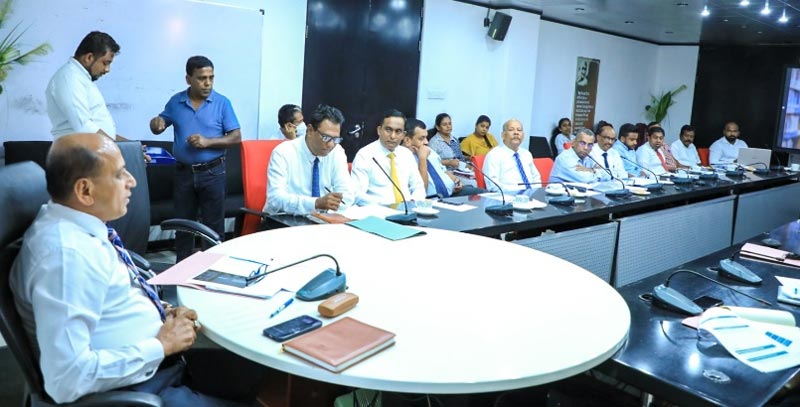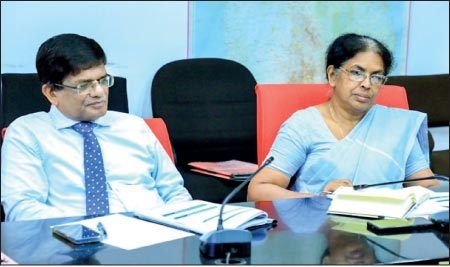Wednesday Feb 18, 2026
Wednesday Feb 18, 2026
Wednesday, 27 March 2024 02:37 - - {{hitsCtrl.values.hits}}

 The Ceylon Institute of Builders (CIOB) convened a highly constructive meeting with Urban Development, Housing, and Construction Secretary W.S. Sathyananda, along with key officials, Construction Industry Development Authority (CIDA) Chairman and his officials.
The Ceylon Institute of Builders (CIOB) convened a highly constructive meeting with Urban Development, Housing, and Construction Secretary W.S. Sathyananda, along with key officials, Construction Industry Development Authority (CIDA) Chairman and his officials.
The primary objective of the meeting was to address the critical challenges encountered by construction contractors and consultants amidst the impact of pandemic and subsequent economic crisis.
During the meeting, Secretary Sathyananda delivered insightful opening remarks, diligently elucidating the plights faced by the construction industry and contractors as a result of the pandemic and economic crisis. He emphasised the need for support and assistance to improve the industry and enable contractors and the consultants to effectively navigate these complex challenges. The Secretary further conveyed that his Ministry, in collaboration with CIDA, Chambers, Associations, institutions and other stakeholders of the industry formulated various activities designed to support affected construction contractors and the industry as a whole.
The Ceylon Institute of Builders and its members extended their appreciation, further commitment and support to the Ministry and CIDA for their remarkable and outstanding efforts in safeguarding and propelling the industry forward.
One of the pressing issues highlighted during the meeting was the lack of proper adherence by clients, consultants, and Government institutions to the directives, guidelines, and instructions provided to address the evolving circumstances and protect the interests of contractors and consultants and the industry. Inconsistent and varied interpretational approaches by different consultants and government agencies, amid the unprecedented situation faced by the construction industry and the economic and social crisis in Sri Lanka, have resulted in numerous disputes arising from existing contracts.
These disputes have led to delays in settlement of payments, increased expenditure on actual costs, additional payments, and challenges related to enforcing liquidity damages and inadequate reimbursement of costly operational expenses, both at the head office and project sites. The repercussions of these issues include threats to project timelines, working capital, operational efficiency, and even insolvencies and bankruptcies within the industry.
During the meeting, participants also emphasised the urgent need for regulatory and policy changes in existing contracts within the Sri Lankan context, with the aim of proactively preventing disputes and conflicts before they arise by way of addendums or any other means. This is particularly important considering the current state of the construction industry, which has been severely impacted by multiple setbacks caused by the unprecedented crisis. The resulting time-consuming and costly disputes have not only negatively affected the industry’s health, but also become a burden on the economy due to weak cash flows.
Therefore, it was strongly emphasised during the meeting that immediate action should be taken to address this issue and initiate necessary relief measures and establish a regulatory framework that safeguard the industry.
Under such circumstances, contractors are encountering various difficulties in their day-to- day operations, leading to financial distress, debt burdens, significant mental, emotional, and physical challenges.
In addition to the challenges arising from the enforcement of contractual terms and clauses during these unprecedented crisis circumstances, other issues discussed in the meeting focused on the need to amend current terms and clauses as means to address these unique challenges which are not originally anticipated by experienced contractors. The urgent amendments proposed by contractors would allow for fair compensation of actual costs and time during the construction process. Contractors made a categorical appeal for a cabinet decision to enforce these amendments, ensuring that they can be implemented without any ambiguities or misinterpretations by various stakeholders. These measures are considered indispensable for preventing losses and safeguarding the financial stability of contractors amidst the multiple crisis situations being experienced in Sri Lanka.
Further, contractors earnestly deliberated on the Construction Industry Development Act No. 13 of 2014. They extensively discussed the powers, responsibilities, implementation, and applicability of the Act, particularly against the backdrop of the exceptional challenges posed by the COVID-19 pandemic and the prevailing economic crisis.
The primary concern of the contractors was to ascertain how the Act could effectively inform and shape the decision-making process pertaining to compensation, remedial measures, and relief measures, in order to address the industry’s issues in a comprehensive manner in terms of industry Development perspectives.
The importance of ensuring continuity of construction projects was stressed as delays and uncertainties can have ripple effects on the economy and society as a whole. These measures are considered indispensable for preventing losses and safeguarding the financial stability of contractors amidst the multiple crisis situations being experienced in Sri Lanka.
During the meeting, it was stressed that another significant aspect of the negative impact caused by the conflicts and disruptive situation is the demoralisation and discouragement experienced by the next generation of individuals seeking to enter the construction industry. This includes aspiring entrepreneurs, professionals, and the workforce. The ongoing challenges and disputes within the industry can deter these individuals from pursuing their careers in construction, resulting in a lack of fresh talent and innovative ideas.
Recognising the importance of nurturing and encouraging the next generation, it was emphasised that addressing these issues and creating a supportive environment is crucial. This involves implementing measures that inspire confidence and provide opportunities for growth, allowing the industry to attract and retain young talent. By fostering a positive and stimulating atmosphere, the construction industry can ensure a sustainable future and preserve its position as a vital sector for economic development.
The Ceylon Institute of Builders and the participating officials expressed their mutual determination to work collaboratively in tackling these critical issues. They agreed to engage in further discussions, industry-wide consultations, and prioritise the implementation of necessary legislative and policy reforms aimed at supporting and bolstering the construction industry during these testing times.